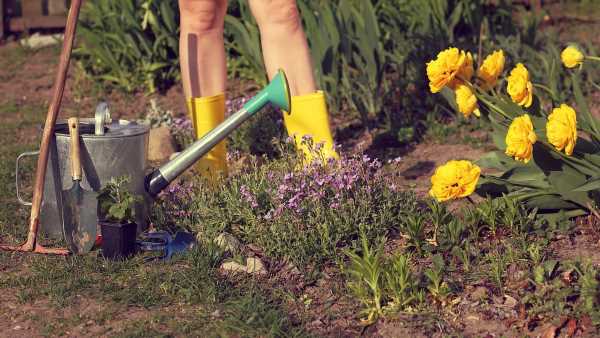
I’m a gardening expert and these are 7 little-known laws you might be breaking without realising (and risking being fined up to £20,000!)
- British garden maintenance experts have revealed a list of little known laws
- READ MORE: The 7 plants which could wreck havoc in your garden
As Britain basks in the September sunshine, many may be tempted to head into the garden for a spot of extra maintenance and tidying up.
But before heading into your outdoor space, it’s best to brief yourself of a few garden rules you could be breaking unknowingly.
British garden maintenance experts at Toolstation told FEMAIL a list of little known garden laws – as well as what to do if you suspect a law has been broken.
In extreme cases, breaking these laws could land you a fine of up to £20,000 – although typically, some disputes can be resolved via a friendly chat with your neighbour.
Here, we reveal a list of seven garden laws you may not be aware of…
British garden maintenance experts at Toolstation told FEMAIL a list of little known garden laws – as well as what to do if you suspect a law has been broken(Pictured: Stock image of a garden enthusiast)
1. Tree removal and pruning
Having a neighbour’s overgrown tree block a footpath or hang over your garden fence can be more than frustrating.
But as they say, one man’s trash is another man’s treasure – so it’s best to seek permission before taking matters into your own hands.
The experts revealed: ‘If one neighbour wishes to remove or heavily prune a tree that the other neighbour values, disputes can arise over the impact on the view, shade, or privacy.
‘However, the good news is, if the tree is within your property boundary, it is ultimately your choice what you do with it.
‘But, some trees may be protected by a Tree Protection Order (TPO) which makes it an offence to uproot, top or destroy them.
‘The maximum fine for breaking this law is £20,000, so make sure you double check’.
To check if a tree on your property is protected by a TPO, contact your local council for a map that shows this information.
Alternatively, you can ask to speak with your local tree officer.
2. Property boundaries and fences
Garden fence boundaries continue to ignite the most furious of debates between neighbours.
In an ideal world, common sense would rule which side of the fence belongs to whom. Sadly, it’s not that simple.
The experts advised to check the deeds to your property to ‘determine the correct boundaries’.
Meanwhile height is another matter. The experts explained: ‘Hedges and fences should be no more than two metres high, and you could be asked by the council to take them down if a neighbour complains about the height.
‘Luckily, standard fence sizes are less than 2 metres tall so you shouldn’t have a problem.
‘The height of fences or hedges can cause disputes between neighbours if one party feels the height has exceeded the two-metre guidance.’
3. Feeding birds
There’s an abundance of benefits associated with feeding birds, from the delightful company they bring to ridding your garden of pests.
There are no specific laws in the UK that make it illegal for individuals to feed birds, and it is usually encouraged in order to keep wildlife happy and healthy.
But if using mixtures like bird feed to feed birds, you must ensure it is stored properly, or it may attract rats.
The experts explained: ‘If the situation turns particularly bad and rats become a problem, you could be issued with an abatement notice asking you to stop and fix the problem.
‘If you don’t stop the feeding, you could get a maximum fine of £5,000 or a Community Protection Notice – it would have to get pretty bad to get to this point, though’.
4. Garden structures and additions
Some may be shocked to learn that even private constructions like sheds can be governed by these laws.
The experts explained: ‘Disputes can arise over the construction of sheds, pergolas, or other garden structures if they obstruct views or violate local building regulations.
‘If you’re not sure, have a chat with your neighbours to let them know what you’re planning and, if there’s an issue, get in touch with your local council who can give you more guidance’.
What should you do if you think your neighbour has broken a garden law?
If you find that yourself or someone else has broken a garden law, the best thing to do is know your rights.
It is also advised to settle on things amicably where possible: ‘Try to resolve any garden disputes face to face with your neighbour by discussing your concerns before turning to the law.
‘Failing that, you should try written communication to let them know your feelings in a non-confrontational manner.
‘If the problem persists, you should let them know you intend to involve the council to resolve the issue’.
Being aware of this rule can lead to an improved relationship with your neighbours and keep you on the right side of the law.
5. Overhanging branches and encroaching plants
Another famous bone of contention is overhanging tree branches.
When tree matter like branches, vines, or roots extend into another property, it can lead to disagreements over potential damage to structures and most especially blocked views.
You may opt to get ahead of the situation by trimming down the tree or plant yourself, but beware as this could be trespassing.
The experts explained: ‘When trimming overhanging branches, you can only trim up to the boundary of your property otherwise this could be seen as trespassing.
‘You can climb into the tree to carry out the work if needed, but only on your property and make sure to stay on your side of the fence if you don’t have permission to enter your neighbour’s garden.’
Fruit trees and flowers blossoming in a garden can feel like a real treat – especially because they come with an array of delectable fruits and flowers in full bloom.
And perhaps you’ve spotted some juicy blueberries or shiny apples growing on an overhanging branch that could make for the perfect fruit pie.
Not too fast – you could be breaking the law.
While you are permitted to trim branches that hang into your garden from another property, the attached, plants, flowers, and fruit are off limits.
Taking or cutting them down without permission is against the law, and your neighbour has the right to ask for them back.
Our expert said it is unlikely your neighbour will have an issue, but best practice is to check first.
They explained: ‘You should also avoid tossing any trimmings into your neighbour’s garden, as this could be considered garden waste fly tipping’.
6. Trees blocking light
According to the Rights of Light act 1959, if a window has received natural light for 20 years or longer, neighbours are not allowed to block it with a new tree.
The experts said: ‘If you do plan to plant a new tree, it’s best to choose a different corner of the garden or opt for a smaller tree to avoid interfering with your neighbour’s natural light’.
7. Right to privacy
Despite the complexities of garden politics, you are still entitled to your privacy.
Stalking, voyeurism or general intrusion of any kind should not be done without your permission.
The experts revealed: ‘Make sure to place sheds, outhouses or security cameras in positions where they won’t affect your neighour’s privacy.
Source: Read Full Article
